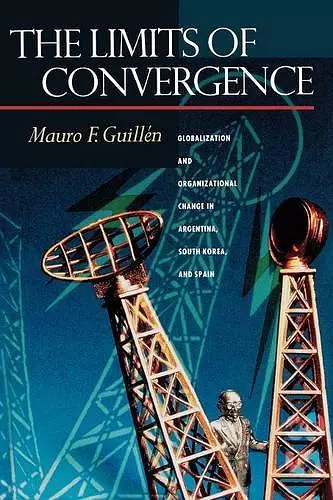The Limits of Convergence
Globalization and Organizational Change in Argentina, South Korea, and Spain
Format:Paperback
Publisher:Princeton University Press
Published:15th Aug '03
Should be back in stock very soon

This is a valuable contribution, based on an impressive collection of different kinds of data combined with some smart thinking. Globalization is almost an academic buzzword, and has generated too much trendy-sounding but muddle-headed thinking. Guillen cuts through the jargon and dissects the issues precisely. He also brings some new cases to the discussion. His book will be of interest to academic scholars, but also to policy analysts and business school students. -- Bruce Carruthers, Northwestern University, author of "City of Capital" Mauro Guillen's rich narrative of industrial strategy in Argentina, South Korea, and Spain sets its sights squarely on the conventional wisdom. It fills a gaping hole in comparative studies, and it is the first book to succeed at showing the substantial variation that persists in national economic institutions. It effectively undermines a fundamental assumption that shapes contemporary economic thought. -- Frank Dobbin, Princeton University
Challenges the notion that globalization encourages economic convergence. Analyzing the social, political, and economic conditions underpinning the rise of various organizational forms, this book shows that business groups, small enterprises, and foreign multinationals play different economic roles depending on a country's path to development.This book challenges the widely accepted notion that globalization encourages economic convergence--and, by extension, cultural homogenization--across national borders. A systematic comparison of organizational change in Argentina, South Korea, and Spain since 1950 finds that global competition forces countries to exploit their distinctive strengths, resulting in unique development trajectories. Analyzing the social, political, and economic conditions underpinning the rise of various organizational forms, Guillen shows that business groups, small enterprises, and foreign multinationals play different economic roles depending on a country's path to development. Business groups thrive when there is foreign-trade and investment protectionism and are best suited to undertake large-scale, capital-intensive activities such as automobile assembly and construction. Their growth and diversification come at the expense of smaller firms and foreign multinationals. In contrast, small and medium enterprises are best fitted to compete in knowledge-intensive activities such as component manufacturing and branded consumer goods. They prosper in the absence of restrictions on export-oriented multinationals. The book ends on an optimistic note by presenting evidence that it is possible--though not easy--for countries to break through the glass ceiling separating poor from rich. It concludes that globalization encourages economic diversity and that democracy is the form of government best suited to deal with globalization's contingencies. Against those who contend that the transition to markets must come before the transition to ballots, Guillen argues that democratization can and should precede economic modernization. This is applied economic sociology at its best--broad, topical, full of interesting political implications, and critical of the conventional wisdom.
"This book offers a sophisticated and lively analysis of three well-researched and important cases of distinctive political economies. It is a valuable contribution to the debate about the impact of globalization on national trajectories and the varieties of capitalism in the modern world."--Anthony W. Pereira, Political Science Quarterly "A very ambitious study, striding across a number of disciplines... This is a groundbreaking contribution to the study of business organization and economic development."--International Affairs "This is an important book: theoretically nuanced, comparative in the best sense, and empirically rich."--Stephen Haggard, American Journal of Sociology "The strength of this book is its comparative and historical approach to the study of organizational and institutional change... [A]n informative work and a valuable contribution to the literatures on these countries and to debates about globalization generally."--Robert K. Schaeffer, Social Forces
ISBN: 9780691116334
Dimensions: unknown
Weight: 397g
304 pages